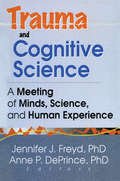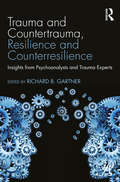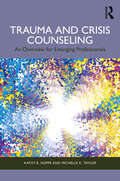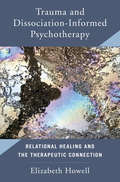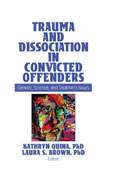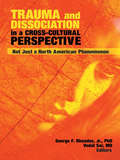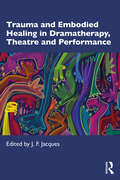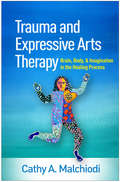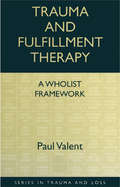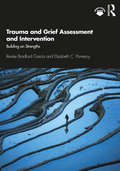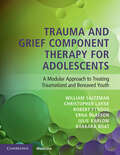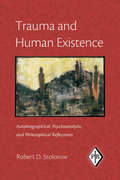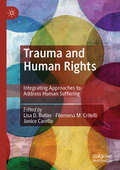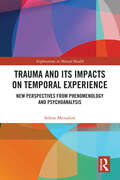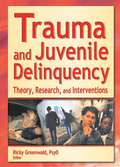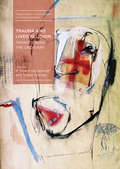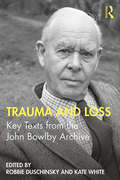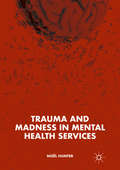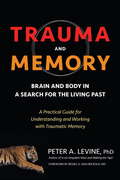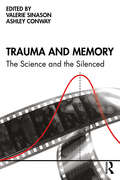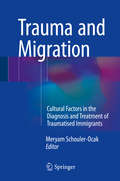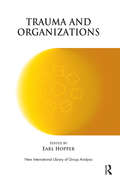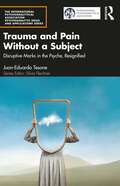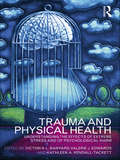- Table View
- List View
Trauma and Cognitive Science: A Meeting of Minds, Science, and Human Experience
by Jennifer J Freyd Anne P DeprinceDecipher the complex interplay of neurology, psychology, trauma, and memory!In the midst of the controversies over how repressed, false, and recovered memories should be interpreted, Trauma and Cognitive Science presents reliable original research instead of rhetoric. This landmark volume examines the way different traumas influence memory, information processing, and suggestibility. The research provides testable theories on why people forget some kinds of childhood abuse and other traumas. It bridges the cognitive science and clinical approaches to traumatic stress studies.Written by the foremost researchers in the field, including Bessel van der Kolk and Jennifer Freyd, these scientific evaluations of the way traumatic memories are processed offer powerful new perspectives on the interplay of biology and psychology. Trauma and Cognitive Science discusses a range of traumas, including combat, child abuse, and sexual assault across the lifespan. Fascinating perceptual experiments shed light on the cognitive uses of dissociation, the encoding and recall of memory, and the effects of early trauma on subsequent information processing. Trauma and Cognitive Science offers solid information on the most challenging questions in this field: How is memory encoded, stored, and retrieved? How is it forgotten? How does trauma influence these processes? What kinds of memories can be created by suggestion? What physical changes take place in the brain under traumatic stress? How is consciousness disturbed during and after trauma? What are the ethical, clinical, and societal implications of traumatic stress studies? How can people suffering from traumatic memories be healed? Trauma and Cognitive Science also offers an astonishing array of true case studies, including the story of an adult woman who was raped, went to court, and saw her rapist convicted--and then forgot the whole traumatic episode. The independently corroborated accounts of recovered memories and the carefully designed research studies on multiple modes and levels of memory may offer the key to understanding how we remember and why we forget. The results of these controlled scientific studies have wide-ranging implications for abuse survivors, combat veterans, rape victims, and people who have survived traumatic events from earthquakes to car accidents. Written in clear, accessible prose, Trauma and Cognitive Science belongs on the bookshelf of all mental health professionals, researchers in the areas of traumatic stress and child abuse, attorneys, judges, and survivors of abuse and trauma.
Trauma and Countertrauma, Resilience and Counterresilience: Insights from Psychoanalysts and Trauma Experts (Psychoanalysis in a New Key Book Series)
by Richard GartnerTreating traumatized patients takes its toll on the treating clinician, giving rise over time to what Richard B. Gartner terms countertrauma in the psychoanalyst or therapist. Paradoxically, a clinician may also be imbued with a sense of optimism, or counterresilience, after learning how often the human spirit can triumph over heartbreakingly tragic experiences. Trauma and Countertrauma, Resilience and Counterresilience brings together a distinguished group of seasoned clinicians, both trauma specialists and psychoanalysts. Their personal reflections show what clinicians all too rarely dare to reveal: their personal traumatic material. They then discuss how they develop models for acknowledging, articulating, and synthesizing the countertrauma that arises from long-term exposure to patients’ often-harrowing trauma. Writing openly, using viscerally affecting language, the contributors to this exceptional collection share subjective and sometimes intimate material, shedding light on the inner lives of people who work to heal the wounds of psychic trauma. By the same token, many of these clinicians describe how working intimately with traumatized individuals can affect the listener positively, recounting how patients’ resilience evokes counterresilience in the therapist, allowing the clinician to benefit from ongoing contact with patients who deal bravely with horrific adversity. Paradoxically, a clinician may be imbued with a sense of optimism after learning how often the human spirit can triumph over heartbreakingly tragic experiences. Trauma and Countertrauma, Resilience and Counterresilience will appeal to psychoanalysts, psychoanalytic psychotherapists, and trauma experts, offering a valuable resource to those beginning their careers in mental health work, to teachers and supervisors of trauma therapists, to experienced clinicians struggling with burnout, and to anyone who wants to understand the psychotherapeutic process or indeed the human condition.
Trauma and Crisis Counseling: An Overview for Emerging Professionals
by Kathy B. Hoppe Michelle K. TaylorTrauma and Crisis Counseling: An Overview for Emerging Professionals is an introduction to trauma for students, new counselors, and other helping professionals. The book provides a sweeping overview of trauma from more than 500 sources. It includes definitions, a clear exploration of trauma’s neurobiology, information on assessment and diagnosis, and summaries of the primary models of evidence-based treatments.The text also addresses suicidality, crisis, and disasters, as well as the challenges faced in providing care to people who experience trauma. Throughout the book, the authors focus on what it means to be trauma-informed and how to integrate resiliency in trauma work. The material is presented in a conversational way using case studies, examples, and practical activities to enhance the reader’s learning.Trauma and Crisis Counseling lays the foundation for effective trauma work in a readable format.
Trauma and Dissociation Informed Psychotherapy: Relational Healing And The Therapeutic Connection
by Elizabeth HowellA fresh look at the importance of dissociation in understanding trauma. A new model of therapeutic action, one that heals trauma and dissociation, is overtaking the mental health field. It is not just trauma, but the dissociation of the self, that causes emotional pain and difficulties in functioning. This book discusses how people are universally subject to trauma, what trauma is, and how to understand and work with normative as well as extreme dissociation. In this new model, the client and the practitioner are both traumatized and flawed human beings who affect each other in the mutual process that promotes the healing of the client—psychotherapy. Elizabeth Howell explains the dissociative, relational, and attachment reasons that people blame and punish themselves. She covers the difference between repression and dissociation, and how Freud’s exclusive focus on repression and the one-person fantasy Oedipal model impeded recognition of the serious consequences of external trauma, including child abuse. The book synthesizes trauma/dissociation perspectives and addresses new structural models.
Trauma and Dissociation in Convicted Offenders: Gender, Science, and Treatment Issues
by Laura S. Brown Kathryn QuinaBetter understand the men and women most affected by trauma in our society Convicted offenders quite often are found to have a history of trauma. Trauma and Dissociation in Convicted Offenders: Gender, Science, and Treatment Issues provides a comprehensive look at the connection between complex trauma and the likelihood of being a convicted offender. This unique text focuses on what factors increase the likelihood of being a convicted offender, and what treatment possibilities lay ahead for these individuals. Substance abuse, childhood sexual abuse, and other traumatic experiences and their links to incarcerated men and women are discussed in detail. Interventions and research within the corrections system are examined, with recommendations on how to better serve this population. Trauma and Dissociation in Convicted Offenders: Gender, Science, and Treatment Issues takes a reasoned stand on women and men in prison, understanding that while they are being punished for breaking the law, they also are survivors of trauma whose dysfunctions underscore the need for greater understanding and more research. This valuable source presents the most current research results while providing a clear view on important future directions of study and focus. Each chapter of this insightful resource is extensively referenced and many have tables to clearly present data. Topics in Trauma and Dissociation in Convicted Offenders: Gender, Science, and Treatment Issues include: the relationship between post-traumatic stress and lifetime substance abuse among incarcerated women research on women inmates with HIV sexual risk and hazardous drinking behavior study on the link between trauma and women domestic violence offenders dissociation and memory in sex abusers the &’re-criminalization&’ of mental illness the effectiveness of group therapy for incarcerated women survivors of childhood sexual abuse (CSA) challenges, ethical issues, and benefits of conducting research with abuse survivors in a women's prison facility Trauma and Dissociation in Convicted Offenders: Gender, Science, and Treatment Issues is an essential resource for clinicians, educators, students, policymakers, and researchers.
Trauma and Dissociation in a Cross-Cultural Perspective: Not Just a North American Phenomenon
by George F. Rhoades Vedat SarAn international look at the similarities and differences of long-lasting traumaTrauma and Dissociation in a Cross-Cultural Perspective examines the psychological, sociological, political, economic, and cultural aspects of trauma and its consequences on people around the world. Dispelling the myth that trauma-related dissociative disorders are a North American phenomenon, this unique book travels through more than a dozen countries to analyze the effects of long-lasting traumatization-both natural and man-made-on adults and children. Working from theoretical and clinical perspectives, the field&’s leading experts address trauma in situations that range from the psychological effects of "the Troubles" in Northern Ireland to the emergence of "Hikikomori," the phenomenon of social withdrawal in Japanese youth.Reactions to trauma can be both unique according to a person&’s culture and similar to the experiences of others around the world. Dissociation, intense grief, anger, and survivor&’s guilt are common responses as people split off mentally, physically, and emotionally from the source of the trauma, whether it&’s an act of nature (tsunami, earthquake, flood, etc.) or the trauma created by violence, physical, sexual, and emotional abuse, assault, confinement, kidnapping, and war. Trauma and Dissociation in a Cross-Cultural Perspective examines the efforts of clinicians and researchers in Europe, Asia, the Middle East, South America, Australia, and New Zealand to develop sociopsychological methods of providing counseling to people who are suffering physically, emotionally and spiritually, training for professionals counted on to dispense that counseling, and economic and political solutions that might help to limit the devastating effects of natural disasters. Trauma and Dissociation in a Cross-Cultural Perspective examines: the tensions between the National Health Service and the private sector in the United Kingdom how the Mandarin version of the Dissociative Experiences Scale (DES) is used in China Djinnai, a culture-bound syndrome and possession trance disorder found in Iran how colonialism has transmitted trauma to the Maori people of New Zealand transgenerational trauma in Turkey religious rituals and spirit possession in the Philippines "memory wars" in Israel traumatic syndromes among the French differences in dissociative experiences among Chinese and Japanese youth childhood trauma in Argentina and much moreTrauma and Dissociation in a Cross-Cultural Perspective is an enlightening professional resource for anyone working in psychology, sociology, psychiatry, and psychotherapy.
Trauma and Embodied Healing in Dramatherapy, Theatre and Performance
by J. F. JacquesThis edited volume explores the singularity of embodiment and somatic approaches in the healing of trauma from a dramatherapy, theatre and performance perspective.Collating voices from across the fields of dramatherapy, theatre and performance, this book examines how different interdisciplinary and intercultural approaches offer unique and unexplored perspectives on the body as a medium for the exploration, expression and resolution of chronic, acute and complex trauma as well as collective and intergenerational trauma. The diverse chapters highlight how the intersection between dramatherapy and body-based approaches in theatre and performance offers additional opportunities to explore and understand the creative, expressive and imaginative capacity of the body, and its application to the healing of trauma.The book will be of particular interest to dramatherapists and other creative and expressive arts therapists. It will also appeal to counsellors, psychotherapists, psychologists and theatre scholars.
Trauma and Expressive Arts Therapy: Brain, Body, and Imagination in the Healing Process
by Cathy A. MalchiodiFrom pioneering therapist Cathy A. Malchiodi, this book synthesizes the breadth of research on trauma and the brain and presents an innovative framework for treating trauma through the expressive arts. The volume describes powerful ways to tap into deeply felt bodily and sensory experiences as a foundation for safely exploring emotions, memories, and personal narratives. Rich clinical examples illustrate the use of movement, sound, play, art, and drama with children and adults. Malchiodi's approach not only enables survivors to express experiences that defy verbalization, but also helps them to transform and integrate the trauma, regain a sense of aliveness, and imagine a new future. Purchasers get access to a companion website where they can download and print reproducible tools from the book in a convenient 8 1/2" x 11" size, as well as full-color versions of 26 figures.
Trauma and Forgiveness
by C. Fred AlfordContrary to the view of trauma popularized by literary theorists, Trauma and Forgiveness argues that the traumatized are capable of representing their experience and that we should therefore listen more and theorize less. Using stories and case studies, including testimonies from Holocaust survivors, as well as the victims of 'ordinary' trauma, C. Fred Alford shows that, while the traumatized are generally capable of representing their experience, this does little to heal them. He draws on the British Object Relations tradition in psychoanalysis to argue that forgiveness, which might be expected to help heal the traumatized, is generally an attempt to avoid the hard work of mourning losses that can never be made whole. Forgiveness is better seen as a virtue in the classical sense, a recognition of human vulnerability. The book concludes with an extended case study of the essayist Jean Amery and his refusal to forgive.
Trauma and Fulfillment Therapy: Pathways to Fulfillment (Series in Trauma and Loss)
by Paul ValentFirst Published in 1999. Routledge is an imprint of Taylor & Francis, an informa company.
Trauma and Grief Assessment and Intervention: Building on Strengths
by Elizabeth C. Pomeroy Renée Bradford GarciaWith clarity and eloquence, Trauma and Grief Assessment and Intervention comprehensively captures the nuance and complexity involved in counseling bereaved and traumatically bereaved persons in all stages of the life cycle. Integrating the various models of grief with the authors’strengths-based framework of grief and loss, chapters combine the latest research in evidence-based practice with expertise derived from years of psychotherapy with grieving individuals. The book walks readers through the main theories of grief counseling, from rapport building to assessment to intervention. Each chapter concludes with lengthy case scenarios that closely resemble actual counseling sessions to help readers apply their understanding of the chapter’s content. In the support material on the book’s website, instructors will find a sample syllabus, PowerPoint slides, and lists of resources that can be used as student assignments or to enhance classroom learning. Trauma and Grief Assessment and Intervention equips students with the knowledge and skills they need to work effectively with clients experiencing trauma and loss.
Trauma and Grief Component Therapy for Adolescents
by William Saltzman Christopher M. Layne Robert Pynoos Erna Olafson Julie Kaplow Barbara BoatDeveloped by experts in trauma psychiatry and psychology and grounded in adolescent developmental theory, this is a modular, assessment-driven treatment that addresses the needs of adolescents facing trauma, bereavement, and accompanying developmental disruption. Created by the developers of the University of California, Los Angeles PTSD Reaction Index#65533; and the Persistent Complex Bereavement Disorder Checklist, the book links clinicians with cutting-edge research in traumatic stress and bereavement, as well as ongoing training opportunities. This innovative guide offers teen-friendly coping skills, handouts, and specialized therapeutic exercises to reduce distress and promote adaptive developmental progression. Sessions can be flexibly tailored for group or individual treatment modalities; school-based, community mental health, or private practice settings; and different timeframes and specific client needs. Drawing on multidimensional grief theory, it offers a valuable toolkit for psychologists, psychiatrists, counsellors, and others who work with bereaved and traumatized adolescents. Engaging multicultural illustrations and extensive field-testing give this user-friendly manual international appeal.
Trauma and Human Existence: Autobiographical, Psychoanalytic, and Philosophical Reflections (Psychoanalytic Inquiry Book Series #Vol. 23)
by Robert D. StolorowTrauma and Human Existence effectively interweaves two themes central to emotional trauma - the first pertains to the contextuality of emotional life in general, and of the experience of emotional trauma in particular, and the second pertains to the recognition that the possibility of emotional trauma is built into the basic constitution of human existence. This volume traces how both themes interconnect, largely as they crystallize in the author’s personal experience of traumatic loss. As discussed in the book's final chapter, whether or not this constitutive possibility will be brought lastingly into the foreground of our experiential world depends on the relational contexts in which we live. Taken as a whole, Trauma and Human Existence exhibits the unity of the deeply personal, the theoretical, and the philosophical in the understanding of emotional trauma and the place it occupies in human existence.
Trauma and Human Rights: Integrating Approaches to Address Human Suffering
by Lisa D. Butler Filomena M. Critelli Janice CarelloHuman rights violations and traumatic events often comingle in victims’ experiences; however, the human rights framework and trauma theory are rarely deployed together to illuminate such experiences. This edited volume explores the intersection of trauma and human rights by presenting the development and current status of each of these frameworks, examining traumatic experiences and human rights violations across a range of populations and describing efforts to remediate them. Individual chapters address these topics among Native Americans, African Americans, children, women, lesbian/gay/bisexual/transgender individuals, those with mental disabilities, refugees and asylees, and older adults, and also in the context of social policy and truth and reconciliation commissions. The authors demonstrate that the trauma and human rights frameworks each contribute invaluable and complementary insights, and that their integration can help us fully appreciate and address human suffering at both individual and collective levels.
Trauma and Its Impacts on Temporal Experience: New Perspectives from Phenomenology and Psychoanalysis (Explorations in Mental Health)
by Selene MezzaliraThis unique text develops an original theoretical framework for understanding the relationship between trauma and time by combining phenomenological and psychoanalytical traditions. Moving beyond Western psychoanalytical and phenomenological traditions, this volume presents new perspectives on the assessment and treatment of trauma patients. Powerfully illustrating how the temporal dimension of a patient’s symptoms has until now been overlooked, the text presents a wealth of research literature to deepen our understanding of how trauma disrupts individual temporal experience. Ultimately, the resulting phenomena that occur (including dissociation and cognitive distortions) position time as a transdiagnostic psychological dimension, closely connected to the subject’s sense of self. This text will benefit researchers, academics, and educators with an interest in psychoanalysis, phenomenology, and trauma and dissociation studies more broadly. Those specifically interested in the philosophy of the mind, Freud, and psychotherapy will also benefit from this book.
Trauma and Juvenile Delinquency: Theory, Research, and Interventions
by Ricky GreenwaldLearn how and why trauma is relevant to juvenile delinquency-and what to do about it! This groundbreaking book addresses the connection between childhood trauma and juvenile delinquency. Trauma and Juvenile Delinquency: Theory, Research, and Interventions begins with two chapters presenting theoretical models of the relationship between trauma and the development/persistence of antisocial behavior. Another chapter addresses trauma-related assessment issues for juveniles, and several chapters present cutting-edge research on various aspects of the relationship between trauma and delinquency. Finally, several chapters focus on theory-based and empirically supported trauma-focused therapeutic interventions for juvenile delinquents. No other single source provides such breadth and depth of coverage on this topic! From the editor: "Disruptive behavior disorders are by far the largest type of mental health referral for children and adolescents, while juvenile crime and violence continue to be major social concerns. Several bodies of literature have converged to suggest that trauma is more than incidental to the problem of juvenile delinquency, it contributes to the problem." Trauma and Juvenile Delinquency: Theory, Research, and Interventions explores: how trauma relates to conduct disorder the connection between traumatic victimization and oppositional/defiance problems ways to assess PTSD in adolescents how exposure to violence, delinquent activity, and posttraumatic stress symptomatology are related the unique trauma histories of incarcerated girls and the problems they have adjusting to life within the juvenile justice system how to develop group therapy services for incarcerated male juvenile offenders with PTSD This valuable book also examines the effectiveness of EMDR (Eye Movement Desensitization and Reprocessing) for boys with conduct problems, MASTR (Motivation - Adaptive Skills - Trauma Resolution) for teens with school-related problems, and CPT (Cognitive Processing Therapy) for juvenile delinquents with post-traumatic stress disorder.
Trauma and Lived Religion: Transcending the Ordinary (Palgrave Studies in Lived Religion and Societal Challenges)
by R. Ruard Ganzevoort Srdjan SremacThis book focuses on the power of the ‘ordinary’, ‘everydayness’ and ‘embodiment’ as keys to exploring the intersection of trauma and the everyday reality of religion. It critically investigates traumatic experiences from a perspective of lived religion, and therefore, examines how trauma is articulated and lived in the foreground of people’s concrete, material actualities. Trauma and Lived Religion seeks to demonstrate the vital relevance between the concept of lived religion and the study of trauma, and the reciprocal relationship between the two. A central question in this volume therefore focuses on the key dimensions of body, language, memory, testimony, and ritual. It will be of interest to academics in the fields of sociology, psychology, and religious studies with a focus on lived religion and trauma studies, across various religions and cultural contexts.
Trauma and Loss: Key Texts from the John Bowlby Archive
by Kate White Robbie DuschinskyDuring his lifetime John Bowlby, the founder of attachment theory, was unable to publish as he wished due to strong opposition to his ideas. Now, with the support of the Bowlby family, several complete and near-complete works from the John Bowlby Archive at the Wellcome Collection are published for the first time. The collection spans Bowlby’s thinking from his early ideas to later reflections, and is split into four parts. Part 1 includes essays on the topic of loss, mourning and depression, outlining his thoughts on the role of defence mechanisms. Part 2 covers Bowlby’s ideas around anxiety, guilt and identification, including reflections on his observations of and work with evacuated children. Part 3 features three seminars on the subject of conflict, in which Bowlby relates clinical concepts to both political philosophy and psychoanalysis in innovative ways. Part 4 consists of Bowlby’s later reflections on trauma and loss, and on his own work as a therapist. This remarkable collection not only clarifies Bowlby’s relationship with psychoanalysis but features his elaboration of key concepts in attachment theory and important moments of self-criticism. It will be essential reading for clinicians, researchers, and others interested in human development, relationships and adversity.
Trauma and Madness in Mental Health Services
by Noël HunterHow do survivors of child abuse, bullying, chronic oppression and discrimination, and other developmental traumas adapt to such unimaginable situations? It is taken for granted that experiences such as hearing voices, altered states of consciousness, dissociative states, lack of trust, and intense emotions are inherently problematic. But what does the evidence actually show? And how much do we still need to learn?
Trauma and Memory
by Peter A. Levine Bessel A. van der KolkIn Trauma and Memory, bestselling author Dr. Peter Levine (creator of the Somatic Experiencing approach) tackles one of the most difficult and controversial questions of PTSD/trauma therapy: Can we trust our memories? While some argue that traumatic memories are unreliable and not useful, others insist that we absolutely must rely on memory to make sense of past experience. Building on his 45 years of successful treatment of trauma and utilizing case studies from his own practice, Dr. Levine suggests that there are elements of truth in both camps. While acknowledging that memory can be trusted, he argues that the only truly useful memories are those that might initially seem to be the least reliable: memories stored in the body and not necessarily accessible by our conscious mind.While much work has been done in the field of trauma studies to address "explicit" traumatic memories in the brain (such as intrusive thoughts or flashbacks), much less attention has been paid to how the body itself stores "implicit" memory, and how much of what we think of as "memory" actually comes to us through our (often unconsciously accessed) felt sense. By learning how to better understand this complex interplay of past and present, brain and body, we can adjust our relationship to past trauma and move into a more balanced, relaxed state of being. Written for trauma sufferers as well as mental health care practitioners, Trauma and Memory is a groundbreaking look at how memory is constructed and how influential memories are on our present state of being.
Trauma and Memory: The Science and the Silenced
by Valerie SinasonTrauma and Memory will assist mental health experts and professionals, as well as the interested public, in understanding the scientific issues around trauma memory, and how this differs from other areas of memory. This book provides accounts of the damage caused to psychology and survivors internationally by false memory groups and ideas. It is unequivocally passionate about the truth of trauma memory and exposing the damaging disinformation that can seep into the field. Contributors to this book include leading professionals from the field of criminology, law, psychology and psychotherapy in the UK and USA, along with survivor-professionals who understand only too well the damage such disinformation can cause. This book is a valuable resource for mental health professionals of all disciplines including those involved with relevant law and public health policy. It will also help survivors and survivor-professionals in gaining insight into the forces resisting disclosure.
Trauma and Migration
by Meryam Schouler-OcakThis book provides an overview of recent trends in the management of trauma and post-traumatic stress disorders that may ensue from distressing experiences associated with the process of migration. Although the symptoms induced by trauma are common to all cultures, their specific meaning and the strategies used to deal with them may be culture-specific. Consequently, cultural factors can play an important role in the diagnosis and treatment of individuals with psychological reactions to extreme stress. This role is examined in detail, with an emphasis on the need for therapists to bear in mind that different cultures often have different concepts of health and disease and that cross-cultural communication is therefore essential in ensuring effective care of the immigrant patient. The therapist's own intercultural skills are highlighted as being an important factor in the success of any treatment and specific care contexts and the global perspective are also discussed.
Trauma and Organizations (The New International Library of Group Analysis)
by Earl HopperThis book is concerned with the study of organizations of various kinds. It examines the patterns of conscious and unconscious life of those organizations in which traumatic experience is ubiquitous and understanding the variations in individual, group, and organizations.
Trauma and Pain Without a Subject: Disruptive Marks in the Psyche, Resignified (The International Psychoanalytical Association Psychoanalytic Ideas and Applications Series)
by Juan-Eduardo TesoneTrauma and Pain Without a Subject explores the necessity of the subject of trauma emerging, particularly when a victim has experienced but not worked through disruptive situations, in order for unconscious pain to finally be experienced.The book is presented in three parts, with the first, "Transgression and Crime", uncovering silence around the topic of incest and sexual violence within the clinic. The second part, "Between Completeness and Nothingness", develops the topic of sexual violence and considers the construction of femininities and masculinities within the paradigm of a heteronormative patriarchal society, with reference to Shakespeare’s Much Ado About Nothing. The third part, “Yes, We See, But What? What We Hear”, explores the intimate relation between the visual and the auditory, especially in relation to hysteria.Trauma and Pain Without a Subject will be of great interest to psychoanalysts in practice and in training, and to all psychoanalytic practitioners working with trauma.
Trauma and Physical Health: Understanding the Effects of Extreme Stress and of Psychological Harm
by Kathleen A. Kendall-Tackett Victoria Banyard Valerie EdwardsTrauma research and clinical practice have taught us much about the widespread problems of child maltreatment, partner violence, and sexual assault. Numerous investigations have documented links between such trauma exposure and long-term negative mental health consequences. As we learn more about traumatic stress, however, increasing attention has been drawn to the less studied physical health effects of maltreatment and trauma. Trauma and Physical Health describes both the negative physical health effects of victimization in childhood as well as exploring theoretical models that explains these links. By bringing together new and current studies on the relationship between trauma and physical health, this edited collection assesses the clinical implications of these links. At a time when the mental health field is becoming increasingly cognizant of the value of collaboration with professionals in the physical health arena, this book suggests ways in which clinicians can work with primary care professionals to better meet the needs of trauma survivors across the lifespan. A key focus of the text is to clarify the relationship between the current knowledge base in trauma and physical health and directions for future research in primary care health settings. With contributors from a wide range of clinical and psychological disciplines, it will be of interest to researchers, clinicians and professionals in the trauma field and to primary care professionals concerned with compassionate care for the traumatized.
